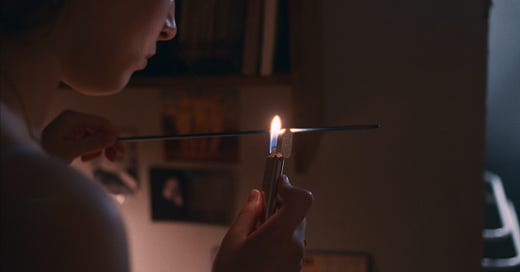There’s a scene in Audrey Diwan’s latest movie Happening, set in 1963 and dedicated entirely to the attempts of a girl named Anne to get an illegal abortion, in which Anne finally tells her two best friends, Hélène and Brigitte, that she is pregnant and wants to not be. Brigitte tells her that it’s “none of their business.” She’s afraid Anne will end up in jail, and that she and Hélène will end up there with her.
At the pro-abortion rally at Foley Square a few weeks ago I saw a sign that said “none of your uterus,” a weak pun on “none of your business,” I guess, implying that what one person does with what goes on inside their uterus is no one else’s business. The problem with claiming that what goes on inside somebody’s uterus is none of anyone else’s business is that it’s just not true, since what we want is for abortion to be legal — in a permanent, codified way, and that makes it the business of, well, everyone. Abortion is a public matter.
This runs, of course, counter to the rhetoric used by “pro-choice” activists for the last several decades, the reasoning that won the right to abortion in the first place, which emphasizes the “privacy” of the decision to get an abortion and makes the issue about a right to “choose.” Yes, we do want to be able to choose. We don’t want to be stuck in a situation in which we have no choice but to carry a pregnancy to term. But the “choice” framing leaves the issue squarely in the realm of the individual, when really, what we are fighting for is the right to bodily freedom, to power over the trajectory of our lives.
It’s hard not to feel right now that feminism failed. I can’t open Instagram without seeing suggested content about losing weight or getting rid of wrinkles. Lately it seems like the best thing feminism has to offer women is an active role in their own objectification. The beauty and fashion industries keep expanding their definitions of who is beautiful in order to wring out every last dollar from us, all undergirded by the rhetoric of beauty-as-power. Second-wave feminists burned their bras in the name of liberation. In 2022, Lizzo is selling shapewear in the name of the same. Something is not right.
We — women, feminists, pro-abortion activists — have been fighting for the right to choose, as individuals, when instead what we should fight for is the right to be free, as a collective. That collective means women, yes, because like it or not we are oppressed on the basis of our sex and our ability to reproduce. It doesn’t matter to the state that I only identify as a woman begrudgingly; as long as I have a uterus and can get pregnant, as long as I am a potential vehicle for creating future workers, it can make laws that make my life infinitely harder. But the collective also means men, and it means people of any gender, because our lives don’t occur in isolation; we’re all inextricably linked to lots of other people through our families and our jobs and our relationships and our choices. Brigitte insisted that Anne’s abortion was none of her business, but of course it was. It touched her life not only in the abstract way, because she might have ended up in the same situation herself one day, but also in a simpler and more concrete way: because it affected her friend.
Under capitalism, individual empowerment is always possible. Just play the game right. Trust that corporations will figure out that including you in their definitions of beauty or power or whatever will make them some more money, and ride that wave all the way to the bank. I don’t want to do that, and I know lots of people who don’t, but it’s always possible. True liberation — living in a world where we all have enough resources of all kinds to support our lives, where we enjoy not only the freedom to live but also the freedom to flourish — that’s much harder to get, and the only way we can ever win it is collectively. Either we all have it or none of us do.
Getting a back-alley abortion is not freedom. Paying thousands of dollars for an illegal abortion in a clinic is not freedom. Aborting with pills ordered surreptitiously through the mail is not freedom. Those things are an individual choice, and the best support a person making that choice can hope for is the cover of darkness over their decision, and maybe a friend or two to trust with the secret. What we deserve, instead, is society’s protection, the positive freedom that comes from a law that unequivocally says, yes, you can end your pregnancy.
Discussion about this post
No posts



this is so so good